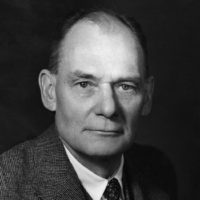
John F. Enders
Harvard Medical School
For the cultivation of the viruses of poliomyelitis, mumps, and measles.
Patient, tireless research in the fundamentals of a science is often overlooked in favor of that which yields more immediate and tangible returns. Yet without the contribution of those workers who devote their lives to basic research, there can be little scientific progress.
For long years John Enders has quietly labored in the bacteriologic laboratory, probing into the unknowns of immunology, actively seeking insight and meaning, his mind constantly alert to the possibility of new generalizations and new relationships. His investigation of immune responses to virus infection led logically to the use of tissue cultures as a means of studying the interaction of virus and cell. Patient pursuit of this line of research carried John Enders through fundamental observations of the mumps virus to studies which culminated in the growth of the poliomyelitis virus on tissue cultures.
These basic observations in the laboratory have constituted a memorable landmark and turning point in the history of poliomyelitis research by opening new vistas and providing new and much needed tools for research. Application of John Enders's findings has led to a radical change in the concept of the pathogenesis of poliomyelitis. His studies have laid a foundation from which others have been able to develop practical laboratory diagnostic procedures. New methods of epidemiologic research have been provided, and studies which may well lead to effective vaccines have been made possible. All of these important contributions in poliomyelitis research are the direct outgrowth of the fundamental research and studies of John Enders and of those who, laboring with him, caught the scientific zeal and enthusiasm that come from association with a true scholar.
